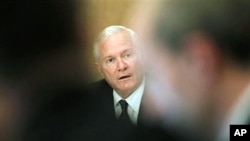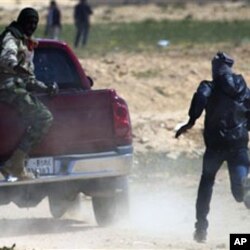U.S. Defense Secretary Robert Gates says it is up to Libyans to ultimately decide their own fate, but that the coalition effort to keep Libyan government forces out of the skies will continue.
"The no-fly zone is not time-limited by the Security Council resolution so I think there is no current timeline in terms of when it might end,"said Gates.
Speaking during a visit to Cairo Wednesday, Gates added that the effects of the mission could be seen soon.
"I think a lot of people who were in opposition and who played a role in the early days have hunkered down," Gates said. "And it may be the changed circumstances where he [Moammar Gadhafi] can't use his aircraft and where he's more challenged in using his armor, they return to the fight. But we just don't know that now."
Such effects were certainly not immediately clear.
The Western-led mission sent out fighter jets to enforce the no-fly zone throughout the day.
But even as the planes took off from an Italian base, forces loyal to Libyan leader Moammar Gadhafi kept up their ground offensive on rebel-held areas.
Residents of Misrata said snipers continued to dominate parts of the western town, while local doctors said hospitals continued to be overwhelmed by victims of government attacks.
In the east, pro-Gadhafi forces have been able to hold off rebel attempts to retake Ajdabiya, relying on the superiority of Grad rockets and tanks against the opposition's make-shift units.
There are reports of airstrikes on government targets in both Misrata and Ajdabiya, but those could not independently confirmed.
In Tripoli, people loyal to Colonel Gadhafi continued to denounce the international mission. Speaking by telephone, government worker Mohamed, who preferred not to give his last name, said there is great public anger.
Mohamed calls the operation a "crusade" and an "unjustified aggression." He asked for an international outcry against the action.
As the fighting continues, British Prime Minister David Cameron announced a broadening of the effort, currently spearheaded by the United States, Britain and France.
"We will be getting logistic contributions from countries like Kuwait and also Jordan. I hope further support will be forthcoming," said Cameron. "But I would be clear about this, because we had to act so quickly on Saturday, it wasn't possible to bring forward as much Arab support as perhaps would have been welcomed, I think, by everybody in the house."
Although the aid is limited, it is one of the few positive developments coalition leaders have encountered in recent days. Criticism of the mission has come not just from Arab nations, but also from NATO members Germany and Turkey, as well as from Russia and China.
With concerns rising, NATO ambassadors were debating Wednesday how to proceed with the operation. The United States says it is eager to hand over control quickly, but it remained unclear exactly who would pick up the lead.

